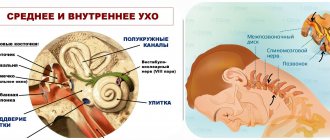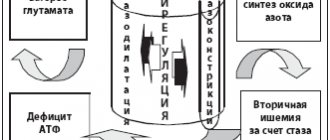Causes of headaches and ear congestion
Constant pain in the head, which causes blocking of the ears, is an alarming symptom for which you should seek medical help. It may indicate physiological changes that do not require therapy, including water entering the ear canals or fatigue. However, in some cases, this sign will help identify dangerous diseases in the early stages and begin treatment on time.
High blood pressure
Chronic hypertension is a disorder in which the pressure in the arteries exceeds normal levels. In a healthy person at rest it is 120/80 mmHg, but it is important to take into account individual characteristics. Blood pressure is considered high if it is 140/90 mmHg. and more. The condition can be caused either by an increase in circulating blood volume or by vascular spasms.
Blood pressure is easy to measure yourself using a tonometer. If the readings are too high, you should seek medical help. Without timely treatment, hypertension poses a danger to the patient and can cause the following complications:
- angina pectoris - acute pain in the chest;
- myocardial infarction - a sharp disruption in the supply of oxygen to the heart muscle;
- chronic heart failure – deterioration of the heart valve apparatus caused by increased load on it;
- arrhythmia is a disturbance in the heart rhythm that can cause a heart attack.
When blood pressure rises, the patient has a headache and pressure on the ears. Symptoms such as dizziness, nausea, hearing loss and poor coordination of movements also occur. With a sudden attack, fainting is possible. Hypertension can be triggered by an increase in atmospheric pressure, physical activity, stress, disruption of the daily routine and other factors. For chronic hypertension, it is necessary to take medications in a course, including to remove excess fluid.
Inflammation of the paranasal sinuses
Sinusitis is an inflammation of the mucous membrane of the paranasal sinuses. With this disease, the nose and ears are blocked, the head hurts, and the overall body temperature rises. The process can be caused by a viral or bacterial infection, and cold weather is often the trigger. Sinusitis occurs in acute or chronic forms and may recur after some time. In addition, the disease can manifest itself as a complication of seasonal colds.
The paranasal sinuses are cavities formed by the bones of the skull. In a healthy person, they are not filled with anything, and their walls are lined with mucous membrane. During the inflammatory process, pathological contents appear in them, which causes headaches. Sinusitis can be serous (with clear liquid contents), catarrhal (cavities filled with mucus), purulent and mixed. Depending on the location of the process, there are several types of this disease:
- sinusitis - inflammation of the maxillary sinus, often occurs as a complication of a cold;
- frontal sinusitis - the process affects the frontal paranasal sinus;
- ethmoiditis - inflammation of the mucous membrane located in the ethmoid labyrinth;
- sphenoiditis - damage to the mucous membrane of the sphenoid sinus.
At home, you can conduct an initial diagnosis of sinusitis. If you sharply tilt your head forward and down, a sharp pain occurs in the forehead. This indicates fluid accumulation in the sinuses. Also, with inflammation of the maxillary sinuses, headaches intensify at low temperatures and decrease in a warm room.
Diseases of the hearing organ
If your ears are blocked due to pain in your head, you should undergo an examination by an otolaryngologist. Chronic diseases of the organ of hearing cause a sharp deterioration in health, increased body temperature, impaired balance and coordination of movements, as well as other symptoms and complications.
- Otitis is an inflammation of the ear in any of its parts. Depending on the location, they distinguish between external, middle and internal, and according to the nature of the course - acute and chronic otitis. The process can be caused by hypothermia or herbs, as well as viral and bacterial infections. Internal purulent otitis is the most dangerous because it can spread to the membranes of the brain and cause meningitis.
- Acoustic neuroma is a benign neoplasm. Its first symptoms include constant headaches and dizziness, as well as hearing loss. Over time, nausea, loss of coordination of movements, and atrophy of the masticatory muscles appear. Neuroma does not disappear on its own and may increase in size. To treat it, surgical techniques, radiation therapy, or combined methods are prescribed.
- Mechanical damage or blockage of the ear canals is another reason why headaches and blocked ears occur. You can get injured even at home, if you do not properly clean your ears or if sharp objects get into your ear canals. The cause of the blockage is often cerumen plug - after its surgical removal, headaches disappear and hearing is restored.
If you suspect a disease of the hearing organ, you must undergo an examination by an otolaryngologist. It uses a special device - an otoscope, which allows you to detect various disorders in the auditory canals. The inner ear is difficult to access for diagnosis and has a complex structure, so it is important to prevent the spread of infection from the external parts.
Other reasons
Headache and ear congestion are common symptoms for a large number of diseases and conditions. They are not necessarily related to hearing health, so it is important to pay attention to associated signs. A more detailed examination reveals the following pathologies:
- cervical osteochondrosis is a chronic disease of the spine in which blood circulation and innervation of the tissues of the head are disrupted;
- viral diseases - influenza, ARVI also manifest themselves as headaches and hearing impairment;
- consequences of traumatic brain injuries , which can manifest themselves many years later.
These symptoms can also occur in a healthy person. So, they often bother you during a flight or in other cases of changes in atmospheric pressure, when water gets into the ear canals, during fatigue or prolonged work at the monitor. However, if they occur regularly, doctors at the Clinical Brain Institute recommend undergoing an examination and determining the exact cause.
Provoking factors
There are many causes of headaches, in rare cases they are associated with:
- feeling of nausea;
- appearing goosebumps, zigzags and other foreign objects before the eyes;
- heartache;
- redness and swelling of the facial part;
- runny nose;
- sore throat;
- severe dry cough.
High blood pressure (hypertension)
With hypertension, a person experiences a squeezing sensation in the head, stuffiness or noise in the ears, and in addition a state of general weakness occurs. Many people susceptible to hypertension note that even their scalp hurts during attacks.
In most cases, this pathological condition is typical for older people, but in recent years, the disease is increasingly being diagnosed in young people and even in childhood. Hypertension has a direct connection with vascular pathologies, which is provoked by disturbances in the functioning of the autonomic nodes. In the chronic course of the disease, severe pain appears, dizziness, and blocked ears due to the pressure exerted on them.
This condition leads to the development of heart problems that thin the myocardial wall. Subsequently, heart failure may occur.
Hypertension occurs against the background of several reasons that contribute to the progression of the disease:
- Hereditary predisposition.
- Being male—men over 40 years of age are susceptible to hypertension.
- Regular stressful situations, the slightest worries, emotional imbalance. These phenomena provoke vascular spasms and tachycardia.
- Excessive alcohol consumption.
- Increased blood cholesterol. A pathologically dangerous condition that provokes the appearance of plaques that clog blood vessels.
- Smoking. Nicotine use causes blockage and constriction of blood vessels and contributes to their narrowing.
- Lack of exercise. In this case, the myocardium loses muscle tone and loses the ability to cope with stress.
- Atherosclerotic pathologies resulting from obesity.
Vegetovascular dystonia
A person begins to feel sudden attacks of headache when climbing to a height or emerging from the water. Ear congestion, ringing and noise may also occur, in addition to headaches. This is how vegetative-vascular dystonia (VSD) manifests itself. The pathological condition is provoked by disturbances in the functioning of the nervous system, which causes similar symptoms.
The development of VSD occurs under the influence of nervous shocks, abnormal current in the inner ear and frequent pressure changes. The disease is characterized by heaviness in the head, which puts pressure on the ears. In most cases, half of the head hurts; attacks can affect both the right and left sides of the temporal lobe.
- What to do if your ears are blocked and you feel dizzy?
Upper respiratory tract diseases
Diseases in the ENT system are often the cause of headaches accompanied by ear congestion. This condition is associated with the fact that pathogenic bacteria penetrate into the nasopharynx through the inhaled air, which settle on the mucous membrane of the organs and provoke the appearance of:
- headaches;
- stuffy ears;
- difficulties in swallowing;
- increased body temperature;
- feverish condition;
- pain in the joints;
- weakness throughout the body;
- pain in the neck.
Similar symptoms occur due to one of the diseases of the upper respiratory tract. These include:
- Ethmoiditis is an inflammatory process in the mucous membrane of the ethmoid bone. The disease can affect both whole cells and individual bone fragments.
- Frontitis is an inflammatory process that occurs in the frontal sinus, which is an integral part of the anterior base of the skull.
- ORZ.
- Flu and ARVI.
- Pharyngitis.
- Sinusitis.
Ear canal disease
Due to the close proximity of the hearing organs to the brain, any infection in the ears affects the entire head. In most cases, in children, but occasionally in adults, acute respiratory infections cause complications on the hearing organs.
Microbes that cause inflammatory processes penetrate the ear canal and cause swelling, which blocks access to the eardrum. This process characterizes the onset of otitis media. The main signs of the disease include headaches, stuffy ears, with characteristic piercing pain. Fever, chills and aching joints occur.
In such cases, it is necessary to immediately seek medical help, otherwise the progression of the disease will lead to such serious consequences as mastoiditis - inflammation of the mastoid process of the temporal bone.
This disease occurs during the acute form of otitis media and affects the mastoid process of the temporal bone. This pathology is dangerous because inflammation often spreads to brain cells.
If a person suddenly begins to have a headache and ear pain, this may indicate damage to the auricle. In some cases, boils, eczema, or fungal growths may form in the ear canal.
Often the cause of headaches and stuffy ears is wax plugs that form in hard-to-reach places. In such cases, only the damaged ear is plugged first. If a foreign body gets into the auricle, it is not recommended to attempt to remove it yourself. Such actions only further damage the ear canal. It is necessary to take a painkiller and call an ambulance.
Another common cause of headaches accompanied by ear congestion is dental problems.
- What causes stuffy ears and headaches and what to do?
Diagnostic methods
If the patient often suffers from headaches and stuffy ears, it is necessary to contact us for a full examination. A simple examination will only indicate visible deviations from the norm, therefore, to understand a more accurate picture, additional techniques are prescribed:
- tonometry – blood pressure measurement;
- MRI of the head and cervical spine is one of the most informative diagnostic methods, which will indicate hidden disorders and neoplasms;
- blood tests - prescribed to determine the causative agent of bacterial diseases, as well as to assess hormonal balance;
- additional methods for diagnosing diseases of the hearing organ, including audoscopy, smear tests, and ultrasound examination.
The Clinical Brain Institute has modern equipment for diagnosing diseases that are accompanied by headaches and ear congestion. Here you can quickly and accurately determine the underlying disease that causes deterioration in well-being.
Treatment of headaches and ear congestion
Treatment tactics are selected individually, depending on the cause of the headache and ear congestion, as well as the patient’s age, concomitant diseases and other factors. To eliminate both the root cause and symptoms of diseases, the following methods can be proposed:
- antibiotic therapy is the main stage in the treatment of bacterial inflammatory processes, as well as the prevention of purulent complications;
- symptomatic treatment , which includes anti-inflammatory, painkillers, ear drops;
- surgical methods - necessary to remove sulfur plugs, neoplasms, as well as to extract the contents of the paranasal sinuses for sinusitis;
- physiotherapy – prescribed for chronic ENT diseases.
Doctors at the Clinical Institute of the Brain prescribe a minimum of therapeutic techniques that will bring maximum results. Here are specialists of a wide and narrow profile with many years of experience in treating various diseases that manifest themselves as headaches and hearing impairment.
Various manifestations of diseases
The above were relatively harmless causes of dizziness. But, if you feel dizzy, your eyes are darkened and your ears are blocked, this may be a symptom of some kind of illness. Each disease also has other symptoms. Consider the following diseases:
- Vegetative-vascular dystonia. In addition to dizziness, it is characterized by pain in the temporal and occipital parts of the head, pain in the eyes and pressure surges. The cause of VSD can be constant stress, sudden physical exertion, overwork, problems with the endocrine system and much more.
- Migraine. This is a special type of headache, the treatment for which, unfortunately, has not yet been found. In addition to dizziness, nausea, tinnitus and obsessive acute pain in the head occur. The main symptom of migraine is a painful reaction to light and noise.
- Otitis (inflammation of the middle ear). The first thing the patient notices is severe pain in the ears or one ear. Dizziness is only an additional symptom. You definitely need to see an otolaryngologist.
- Various diseases of the inner ear. They provoke disturbances in the functioning of the vestibular apparatus. There is a long range of accompanying symptoms, for example, pressure surges, nausea and vomiting, and cold sweats.
- Cervical osteochondrosis or osteoporosis. They make it difficult for blood to flow to the head, so sudden movements, especially with the head, cause dizziness.
- Cancerous tumors. Pathological changes in the body cause all the symptoms of dizziness.
- Traumatic brain injuries. It is quite natural that a violation of the integrity of the integument and the correct passage of necessary processes in the head causes darkness in the eyes and dizziness.
Prevention methods
At home, you should follow simple recommendations from doctors. They will help prevent the development of diseases that cause headaches, ear congestion and general deterioration in well-being. The set of preventive measures includes:
- protection of the head and ears from hypothermia;
- proper nutrition with enough vitamins at any time of the year;
- timely treatment of colds.
The Clinical Brain Institute offers all the conditions for high-quality and comfortable treatment of disorders that cause headaches and ear congestion. There is also timely equipment located here, thanks to which you can quickly and accurately determine the cause of poor health and make an accurate diagnosis.
Clinical Brain Institute Rating: 5/5 — 3 votes
Share article on social networks










